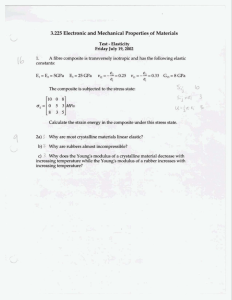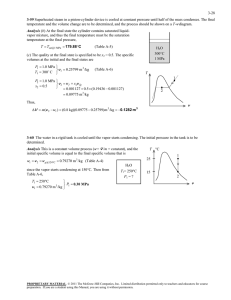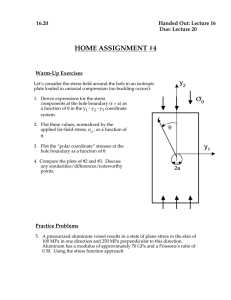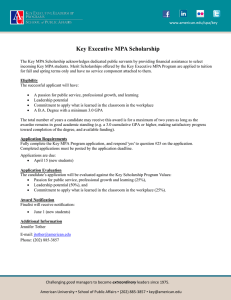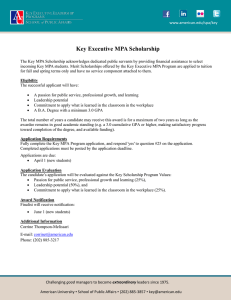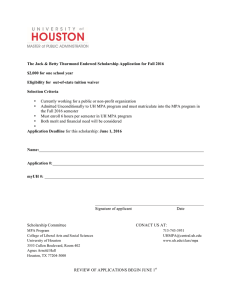Public Administration (M.P.A.)
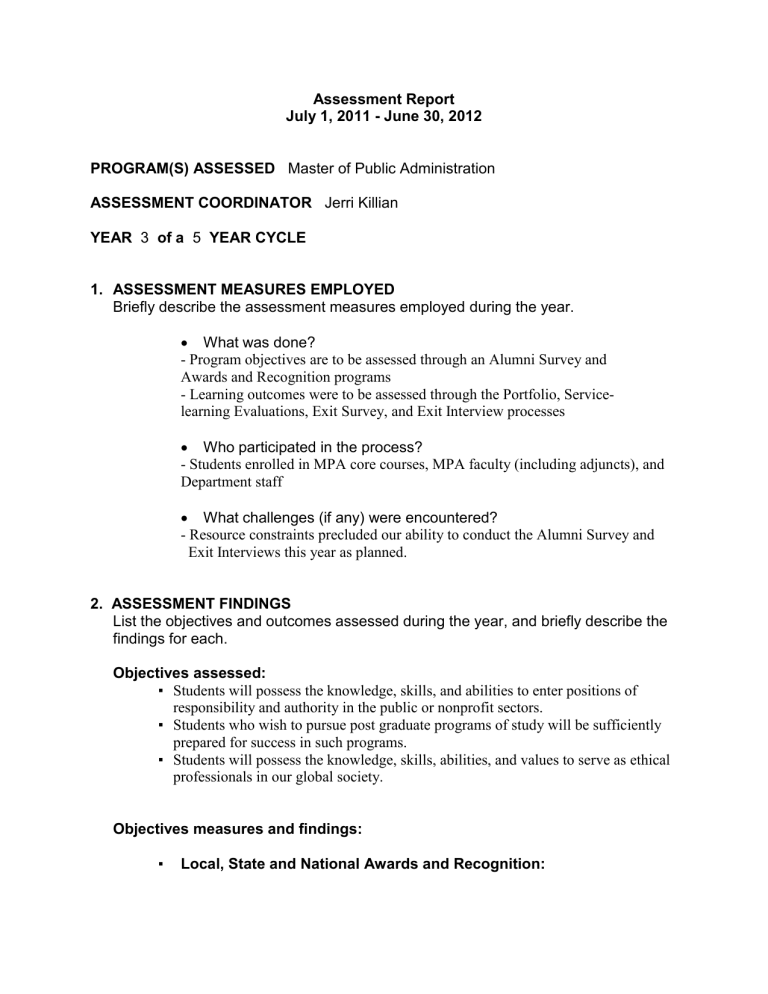
Assessment Report
July 1, 2011 - June 30, 2012
PROGRAM(S) ASSESSED Master of Public Administration
ASSESSMENT COORDINATOR Jerri Killian
YEAR 3 of a 5 YEAR CYCLE
1. ASSESSMENT MEASURES EMPLOYED
Briefly describe the assessment measures employed during the year.
What was done?
- Program objectives are to be assessed through an Alumni Survey and
Awards and Recognition programs
- Learning outcomes were to be assessed through the Portfolio, Service- learning Evaluations, Exit Survey, and Exit Interview processes
Who participated in the process?
- Students enrolled in MPA core courses, MPA faculty (including adjuncts), and
Department staff
What challenges (if any) were encountered?
- Resource constraints precluded our ability to conduct the Alumni Survey and
Exit Interviews this year as planned.
2. ASSESSMENT FINDINGS
List the objectives and outcomes assessed during the year, and briefly describe the findings for each.
Objectives assessed:
▪ Students will possess the knowledge, skills, and abilities to enter positions of responsibility and authority in the public or nonprofit sectors.
▪
Students who wish to pursue post graduate programs of study will be sufficiently prepared for success in such programs.
▪ Students will possess the knowledge, skills, abilities, and values to serve as ethical professionals in our global society.
Objectives measures and findings:
▪ Local, State and National Awards and Recognition:
Findings:
- Lakia Gray was recognized as the Outstanding MPA student by the UAG department and SoGS.
- Amanda Turner was recognized as the Outstanding MPA student by the
UAG department and CoLA.
- Catherine Crosby was recognized as the Outstanding MPA Alumni by the UAG department and CoLA.
▪ Alumni Survey: Survey of alumni in the second and fifth years after graduation.
Findings:
- The Alumni Survey was not performed this year due to constrained resources.
Learning Outcome Assessed: Problem Solving Skills
- Students will possess the advanced knowledge required to evaluate solutions for policy and program problems occurring at various levels of government or in the nonprofit sector.
.
Learning Outcome Measures and Findings:
▪ Portfolios: Consists of a sampling of materials (papers/examinations) from core
MPA courses to demonstrate improvement over time for the stated learning outcomes. Upon completion of four core MPA courses, a mandatory meeting with the student’s advisor shall be scheduled to review and discuss student progress. If warranted to promote satisfactory progress, an additional mandatory meeting shall be scheduled upon completion of seven core MPA courses to review and discuss student performance at that time. Students may access their portfolio at any time and will receive their completed portfolio at the time of the exit interview.
Findings: Faculty advisors complied with the Portfolio process described above and met with 100% of MPA students who had completed four core
MPA courses. Discussions included constructive feedback and helpful recommendations to enhance future student performance, refine students’ programs of study, clarify students’ future career paths, and the like.
Discussions were documented in student files.
- All MPA students met with their respective advisors subsequent to completing four core MPA courses. Student progress was discussed and concerns, if any, were addressed.
- No MPA students required a mandatory advising meeting due to unsatisfactory progress at the completion of 7 core MPA courses.
- Students continue to be granted access to their Portfolios at any time during normal business hours.
▪
Service-Learning Evaluation: at least 75% of students will indicate that service learning increased their depth of understanding of and enhanced their ability to analyze and evaluate solutions for problems related to public or nonprofit administration.
Findings: 100% of students enrolled in service-learning MPA courses indicated that this pedagogical approach enhanced their understanding, ability to analyze, and ability to potentially solve problems relevant to public and nonprofit administration. This finding exceeds the benchmark for this measure by 25%.
▪
Exit Survey : A quantitative survey shall be administered to students enrolled in the core MPA courses (URS 700, 701, 702, 703, 704, 705, 706, 707, and 708/9 or their smester equivalents) at the end of each term to assess perceptions of the extent to which each of these courses and the MPA program to date, respectively, facilitates achievement of stated learning outcomes; a mean score of 2.0 or less (1 is best) on a 4-point scale shall be realized for each course.
Findings : A mean rating score of 1.48 was realized on MPA Exit
Surveys, with a score of 1.52 pertaining to course-related learning outcomes and 1.44 for questions pertaining to the outcomes of the MPA program as a whole. These findings exceed the minimum acceptable standard set forth for these measures and reflect a trend of continuous improvement.
▪ Exit Interview (qualitative): When degree check is completed each term, a member of the CUPA staff will conduct a qualitative interview with each MPA candidate scheduled for graduation to assess student perceptions of achieving stated program learning outcomes and objectives, and to identify potential areas for program improvement; at least 75% of comments shall be favorable.
Findings : Exit Interviews were not performed this year due to constrained resources.
3. RESPONSE TO ASSESSMENT FINDINGS
List planned or actual changes (if any) to curriculum, teaching methods, facilities, or services that are in response to the assessment findings.
Findings: The MPA program will be examining, developing, and implementing new assessment measures and processes over the next few years as we align the redesigned MPA semester curriculum with the new NASPAA (the external
accrediting body for the MPA program) accreditation standards and the NCA assessment process.
- Alumni Surveys and Exit Interviews will be performed when fiscal and human resources become available for these purposes.
4. ASSESSMENT ACTIVITIES FOR COMING YEAR
Briefly describe the learning outcomes to be assessed during the upcoming year and the measures that will be used to assess them.
Findings:
Learning Outcome to be Assessed in 2012-13:
Key MPA Concepts and Principles
-Students will possess mastery of the basic concepts and skills concerning the political, social, technological, organizational, managerial, and economic environments of public or nonprofit administration.
Planned Assessment Measures:
- Portfolio; Internship; Exit Survey; Exit Interview
5. UNIVERSITY LEARNING OUTCOME ASSESSMENT
As part of the HLC Academy project, each program of study will eventually assess two University Learning Outcomes in required courses in the major. One outcome will be assessed in 2014-15, and the second will be added in 2015-16.
Identify the two ULOs that will be assessed and, if possible, the likely course(s) to be used.
University Learning Outcomes: Wright State graduates will be able to:
1. communicate effectively
2. demonstrate mathematical literacy
3. evaluate arguments and evidence critically
4. apply the methods of inquiry of the natural sciences, social sciences, and the arts and humanities
5. demonstrate global and multicultural competence
6. demonstrate understanding of contemporary social and ethical issues
7. participate in democratic society as informed and civically engaged citizens
Findings: Data will be mined from required MPA core courses to assess the following two ULOs:
1. communicate effectively (2014-15)
2. demonstrate understanding of contemporary social and ethical issues
(2015-16)
